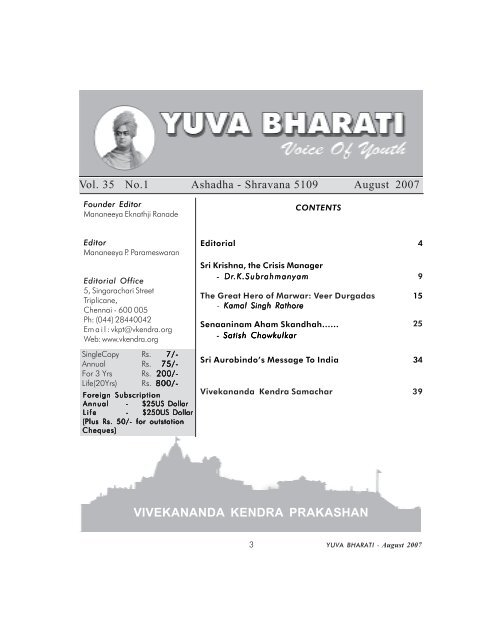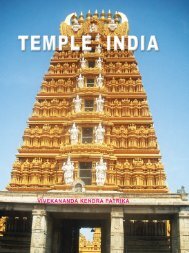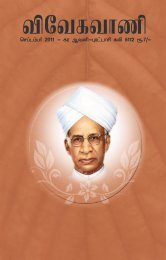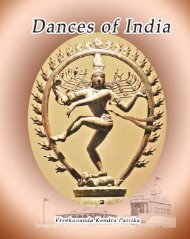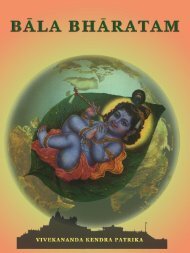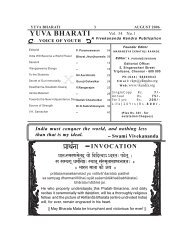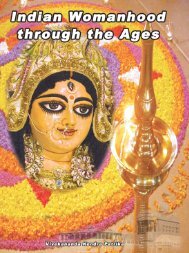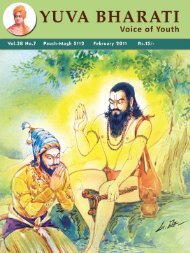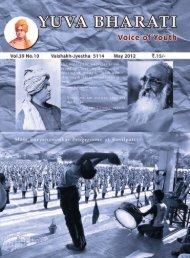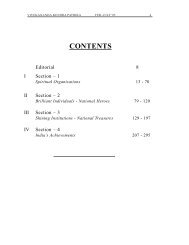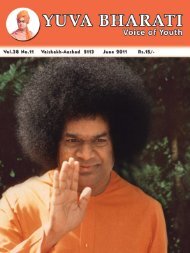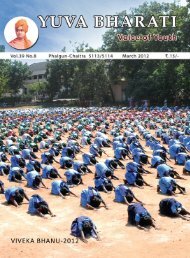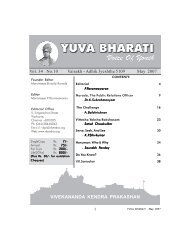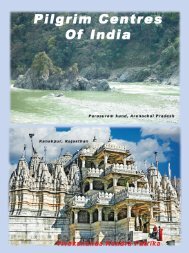Yuva Bharati - August 2007 - Vivekananda Kendra Prakashan
Yuva Bharati - August 2007 - Vivekananda Kendra Prakashan
Yuva Bharati - August 2007 - Vivekananda Kendra Prakashan
You also want an ePaper? Increase the reach of your titles
YUMPU automatically turns print PDFs into web optimized ePapers that Google loves.
Vol. 35 No.1Founder EditorMananeeya Eknathji RanadeAshadha - Shravana 5109CONTENTS<strong>August</strong> <strong>2007</strong>EditorMananeeya P. ParameswaranEditorial Office5, Singarachari StreetTriplicane,Chennai - 600 005Ph: (044) 28440042Email:vkpt@vkendra.orgWeb: www.vkendra.orgSingleCopy Rs. 7/-Annual Rs. 75/-For 3 Yrs Rs. 200/-Life(20Yrs) Rs. 800/-Foreign SubscriptionAnnual - $25US DollarLife - $250US Dollar(Plus Rs. 50/- for outstationCheques)Editorial 4- P.P.ParameswaranSri Krishna, the Crisis Manager- Dr.K.K.Subrahmanyam.Subrahmanyam 9The Great Hero of Marwar: Veer Durgadas 15- Kamal Singh RathoreSenaaninam Aham Skandhah...... 25- Satish ChowkulkarSri Aurobindo’s Message To India 34<strong>Vivekananda</strong> <strong>Kendra</strong> Samachar 39- Dr.K.K.Subrahmanyam.SubrahmanyamVIVEKANANDA KENDRA PRAKASHAN3 YUVA BHARATI - <strong>August</strong> <strong>2007</strong>
Editorialyda yda ih xmRSy GlainÉRvit Éart,A_yuTwanmxmRSy tdaTmanm! s&jaMyhm!.O Arjuna, whenever there is a decline in right living and anincrease in wrong living everywhere, I bring Myself into being(assume a physical body).Come <strong>August</strong> and we bow our heads again before the memory ofMan.Eknathji. <strong>Yuva</strong> <strong>Bharati</strong> reproduces below the full text from one ofhis inspiring editorials published in the issue of November 1973.VIVEKANANDA KENDRA CALLING-EditorYoung India today is throbbing withlife and activity. There is a ferment allround among the people, especiallyamong the youth—the students. Evenduring the exciting phases of thefreedom struggle against the BritishGovernment, such widespreadcommotion and unrest as is nowprevailing was not witnessed. It isindeed a sign of our country returningto its normal health.Unrest, like zest, is a sign of robustlife and is a harbinger of progress. Itgenerates energy and activity. Socialunrest, even though it may sometimesbring in its wake violence andconsequent human suffering, is stillpreferable to social tranquility born outof the people’s inertia. Social inertiaindicates people’s loss of power toreact to any challenging situationconfronting them and is, therefore, asdreadful as paralysis in a human body.A glaring example of that sort of socialquietude was witnessed during thehorrible man-made famine of Bengalin the year 1943. While multitudes ofpeople were being denied food andwere starving, the grain shops andrestaurants, situated right in the midstof those hungry millions, were seencarrying on their business as usualwithout the least fear of being attackedYUVA BHARATI - <strong>August</strong> <strong>2007</strong>4
or looted. This could happen,obviously, not because the people hadreached a Paramahamsa state or weretoo conscientious to take to avowedlycriminal acts for a morsel of food orjust for their physical survival; therewere neither food riots nor did thepeople resort to looting for the simplereason that they had lost all power toreact, resist or assert. Some westerncorrespondents who were in Bengal,then, expressed great surprise over thisphenomenon which they consideredinconceivable in their own countries.In fact, if we look back to our historyof the past several centuries, ourcountry had been under the spell ofutter inertia (Tamas), except for briefperiods of manly vigour and activityhere and there. It is said that BakhtiyarKhilji with a handful of horsemen rodeall the way from Delhi to Bengal,traversing the vast plains of UttarPradesh and Bihar, but that none of thepeople on the way felt like challengingthis band of armed foreigners. It isfurther said that these Turks managedto straightway enter the palace atNadia, the then capital of Bengal, andmassacred the inmates while the king,Lakshamana Sen, fled by the backdoor.Even granting that there is a lotof exaggeration in this historicalaccount as taught in schools, and thatperhaps only a fraction of it may betrue, the fact remains that the peoplehad lost their vigour and the will toresist and were as inert as stocks andstones.Even during Swami <strong>Vivekananda</strong>’stimes he had to face the same appallinginsensateness of the people. Hisbiographers report about an apparentlyqueer piece of advice Swami<strong>Vivekananda</strong> felt like giving to a lazyand indolent youth, who hadapproached him with a desire to knowfrom him what he should do to knowGod and how he was to get free.Swamiji who knew the questioner tobe quite a do-nothing fellow asked him:“Can you tell a lie?” The boy replied,“No”. Swamiji then said to him, “Thenyou must learn to do so. It is better totell a lie than to be a brute, or a log ofwood. You are inactive, you have notcertainly reached the highest statewhich is beyond all action, calm andserene; you are too dull even to dosomething wicked.” Of course, Swamijisaid all this satirically and out of hisexasperation over the vegetatingyoung boy. But this shows amply thateven in Swamiji’s days the apathy ofthe people was one of the majorproblems before the country.Today, however, the people ingeneral, and the younger generation inparticular are showing signs of anawakening from a long stupor ofcenturies. They have begun to feel, andreact to situations favourably orunfavourably, according as they arepalatable or unpalatable to them.Authorities, whether in charge ofuniversities or industries or those at thehelm of government administration,can no more take the people for5 YUVA BHARATI - <strong>August</strong> <strong>2007</strong>
granted; nay, even the parents are notable to command submission fromtheir youngsters.The question “Can you tell a lie?”,put by Swami <strong>Vivekananda</strong> to atypically lazy and inactive student ofthose days, has no relevance today.Because, the student of today hasceased to be the passive andsubmissive creature that he wasyesterday. Today, he is full of energyand his activity covers such novelspheres as Swami <strong>Vivekananda</strong> couldnot have even imagined then. Even anaverage student of today can truthfullysay that he is capable of not only tellinga lie, but can also pelt stones atpassenger-buses and trains, and evenremove fish-plates from the railwaytrack just for the fun of it; he can aswell set fire to buses, trains, buildingsand even knife his teachers just tosatisfy his curiosity to know hownewspapers would report the incidentsnext day.Similarly, the general mass of peopleand especially the younger generationhave now totally got rid of their oldpassivity and submission. They havenot only regained their normal capacityto feel and perceive but have alsodeveloped an ultra sensitiveness. Eventhe presence of an invigilator in theexamination hall makes their bloodboil—nay, the very system ofexamination irritates them. They areequally sensitive, and even allergic, tothe sight of bus-conductors askingbus-fares from their fraternity, railwayinspectors detecting ticketlessstudents, gate-keepers in cinema hallschecking up tickets or even policemenobstructing stone-throwing.In short, the country has, at long last,shed its torpidity and the people noware up and doing. As long as the entirenation was numb with inertia, nothingcould be expected except a graduallyincreasing deterioration. But, by thegrace of God, the country has turnedthe corner, and the people havebecome conscious of themselves andtheir capacity to do and undo, and tobuild and destroy.One may take an alarmist view ofthe present trends in the youngergeneration. But, in fact, there is morereason to rejoice than to be frightened.Because it is not through the peace ofthe graveyard but only through thedynamism of action, whether good,bad or even wicked, that nations,sooner or later, light upon the rightvision and adopt the course ordainedfor them. Out of the present exuberanceof meaningless or destructive activityof the young, there is bound to emergesoon the next phase, the dawn ofwisdom and discrimination (Vivek)which will make the country rediscoverits mission and give a newcreative direction to all its endeavours.YUVA BHARATI - <strong>August</strong> <strong>2007</strong>6
SRI KRISHNA, THE CRISIS MANAGERDr.K.SubrahmanyamIndividuals, institutions, organizationsand countries too cannot avoid one crisisor another in spite of the best ofprecautions. Crisis may be of varyingintensity, nature and frequency.Extraordinary strength andresourcefulness are essential to face andmanage a crisis. The experience gained inmanaging one crisis may not be sufficientto enable a person to face and manage asubsequent crisis of similar or differentnature and magnitude. It ceases to be acrisis, if it is expected on time. Each crisisis unique. Psychic strength and intellectualstrength should invariably be supported byspiritual strength to face and manage acrisis. Sri Krishna is a role model for crisismanagement. Right from his childhood hehas faced crisis after crisis. Successfullyand without losing his cool and smile, hehas managed each crisis without ever beingcaught in it. He is ever free and serene.It is a crisis when an insurmountabledifficulty confronts us most unexpectedly.All the preventive steps and precautionarymeasures may not be of any avail when weare accosted by a crisis. It swallows alllike a tsunami or cyclone, earthquake oran epidemic. Extraordinary tact, will andstrength are needed to face and managethe unavoidable and unexpected danger ordifficulties. Sri Krishna faces variedproblems athome, on thebattlefield, inpolitics, instatecraft andin matterspertaining tospirituality.S r iKrishna’ss i s t e r ,Subhadra wasin love withArjuna. Buttheir eldestb r o t h e rBalbhadraresolved togive her inmarriage toDuryodhana.Traditiondemandsobedience to elders and adherence to theirdecisions. There is now a crisis, a clashbetween the elder’s will and the bride’swish. Subhadra’s desire is to be fulfilledand Balbhadra’s resolve also cannot beopenly defied. Very tactfully Sri Krishnamanages the crisis and satisfies all. Awonderful drama is worked out by Krishna,the exemplary crisis manager. Subhadra9 YUVA BHARATI - <strong>August</strong> <strong>2007</strong>
and Arjuna are happily married with theblessings of all including Balbhadra whowas initially not in favour of Pandavas forthe matrimonial alliance. When Subhadraaccompanied Arjuna to her in-law’s house,there was already Draupadi, the wife ofPandavas. She was already her seniorhaving married Arjuna earlier. Draupadi’slooks were not very inviting, whenSubhadra as a newly wedded bride wasentering her husband’s house. In simplewords, Draupadi was jealous of Subhadra.Sri Krishna smelt the crisis. The treatmentto Subhadra from Draupadi may not begood. The situation requires immediateattention and expert management. SriKrishna, therefore tells Draupadi, “sister,I am handing over my dear Subhadra toyou. She is no more my sister. She isyours. You have to look after her well andtrain her well. She does not know how tospeak nicely. She may now and then feeljealous of you because you have wonArjuna’s heart fully. Nobody is dearer tohim than you. I was initially not in favourof giving my dear and tender agedSubhadra to Arjuna who was alreadywedded to you on account of your mutualand unparalleled love. As a lovingbrother, I would have opted for a personwho is a virgin bridegroom. But then, Iknow that Draupadi is like a loving motheras well to our Subhadra. I am jealous; butDraupadi has been such an all absorbingocean of love that there is no place for anyshade of envy or ill-will in her. Arjuna’slove may wax or wane, but Draupadi’s loveknows no decline. My sister is lucky to beguided by a loving mother-like Draupadi.Because of your overflowing love, mydoubts about Arjuna’s fidelity to Subhadraare all driven away. I am glad, my sister ismarried not only to Arjuna but to Draupadias well. You both love her. Arjuna is herhusband. But you are her elder sister andmother as well”. As Krishna was talkingso, Draupadi’s apprehensions of ill-willevaporated in no time. She wholeheartedlywelcomed Subhadra.On the battlefield, Arjuna, who hashitherto been highly enthusiastic about thewar and victory, suddenly is overcome bydespondency. He does not want to fight.He wants to withdraw from warfare andresolves to be a forest recluse. At themoment when everything is ready for arighteous war which is expected toestablish Dharma, the most importantpillar of the event has begun to totter. Itis a crisis. Sri Krishna rises to the occasion;handles the situation very ably andmanages the crisis. The entireBhagavadgita is a science of crisismanagement. The man who wanted to “runaway” from the Kurukshetra, rises to roarlike a lion and fight a decisive war tovanquish the unrighteous. Mercy is avirtue. Misplaced mercy appears to be avirtue, but it promotes indiscipline andunrighteousness. It is a psychic crisis whenthe mind is under delusion and is unableto be of clear vision. It requires adepthandling. Sri Krishna manages the crisisriddenmind so skilully, intelligently andgently than Arjuna at the end declares“Nashto Mohaha, Smrithir labdhaha;Sthithosmi gatha sandehaha”. All mydelusion is dispelled. I am established inclarity of vision and righteousness ofaction. The art of mind management,especially in a critical state of dilemma anddelusion should be viewed and handledfrom various angles–emotional,YUVA BHARATI - <strong>August</strong> <strong>2007</strong>10
intellectual and spiritual as well. Lovinglyand rationally, Sri Krishna handles Arjuna’splight from spiritual point of view too.What is initially considered to be a psychicweakness is ultimately transformed intospiritual fulfilment.When Krishna was but a boy, there wasmany a crisis. There was hailstorm. Allthe cows, cowherds and the peasants werein difficulty. Sri Krishna made use of thefirm aspect of nature to overcome theviolent expression of nature. He, with thehelp of his brother and friends, uprooteda hillock and made it umbrella-like; andprotected all the affected ones under itsshade. Floods and cyclones, fast spreadingdiseases and accidents are to be verycarefully handled. Men and naturalmaterial must be ushered in to handle thecalamity efficiently and immediately. Splitseconddecision and lightning action areessential while managing a crisis wroughtby nature.When a powerful weapon was about tohit Arjuna’s neck and face, Sri Krishnaresourcefully and instantly averted thedanger by pulling the reins. As the suddenbrakes were applied, the chariot came to ascreeching halt. The horses pulling the carfell on their knees lowering the entirevehicle. The shaft aimed at the neck, couldnot meet its mark on account of the suddendip. Instead, it threw off Arjuna’s helmet.Intelligently, thus, Krishna could avert amajor disaster. While managing a crisis,colossal tragedy can be avoided. The lossor difficulty many be reduced to the barestminimum.Drona at one point of time, in the war,is highly tempestuous killing all in front ofhim. If he is allowed to fight a few hoursmore, perhaps, there will be none amongthe opponents to stand erect on ground.Pandavas have rushed to seek Sri Krishna’sintervention to manage the crisis. Readilythe exemplary manager of any type of crisisasked the eldest of the Pandavas,Dharmaraja, to tell a lie to unnerve theveteran warrior Drona. It should bebrought to his notice by a reliable personthat Aswathama is dead. The tragic newsof the son’s demise would dishearten thefather. Then the opportunity should beseized by Arjuna to slay Drona. Crisismanagement sometimes involves lies aswell. Ambassadors “lie” abroad managingcrisis after crisis for the safety of theirmotherland.On the first day of the greatKurukshetra war, Arjuna’s despondencywas dispelled by Sri Krishna’s Gita and thecrisis was well managed to its diffusion.Absolute reality was often resorted to andhighlighted to drive away Arjuna’s delusionand the resultant crisis. But on thethirteenth day, when Abhimanyu, Arjuna’sson was killed on the battlefield, once againthere was a crisis similar to the first day’sgrief. A mere theoretical analysis of themind and the cosmic truth were enoughto manage the crisis on the first day. But ashock treatment had to be resorted tocircumvent the second crisis. No amountof philosophy or persuasion could restorenormalcy in the mind of Arjuna. The crisiswas so intense and acute that Krishna hadto play a practical role to make thespiritual truth tangible. In the night,Arjuna was taken by Krishna to the starry11 YUVA BHARATI - <strong>August</strong> <strong>2007</strong>
egions where Abhimanyu was shown tothe bereaved father. The “dead’ son insteadof displaying familiarity and affection, onlyexpressed disgust to and ignorance of thevisitor, Arjuna. He asked, “who is whosefather? In what drama did you play therole of my father and when? When andwhere did I act as your son? You and Imight have met on many an occasion, atmany a place for many a purpose, in manya role in the past as but travellers or actors.I do not know who you are. It isunbecoming of you to drag the dreamrelationship or stage-role-play into reality.In the flood of infinite time, many awooden piece floats. While floating thepieces may for a while hit, meet orseparate. Is it not foolish to think thatearthly relationships are true? They areas untrue and transient as the dreamrelationship. You go away from this place.Else, I may have to get you out forcibly”.Arjuna was shocked by the treatmentmeted out to him by the person whom heloved most as son. The delusion, as a result,was shattered. Normalcy was restored.Crisis was well managed and overcome.Truth, absolute truth may have to be madetangible to manage and overcome a crisiseffectively.It may be easy when everything andeverybody is in order functioningmethodically as per the set track. Theentire nature and the people with whomthe managers have to work are notsubservient machines or tools. Even theysometimes go out of control. Thereforecrisis in one’s life is an unavoidable factor.To manage a crisis one should developstrength and skill to face problems andenough resourcefulness to solve them.Krishna is an exemplary manager of alltypes of crisis.Problem facing capacity withstrength and equanimity; problem solvingcapacity with skill and resourcefulness; andsolving the problem for the benefit of allin the future as well with love andlargeheartedness are the essential traits ofa crisis manager.25 YEARS OF VK RDPGuest worshipping Anna Poorna DeviSister Priyamvada leading the prayersYUVA BHARATI - <strong>August</strong> <strong>2007</strong>12
THE GREAT HERO OF MARWAR: VEER DURGADASKamal Singh RathoreDurgadas Rathore is a famouspersonality in the annals of Marwar(Jodhpur). Veer Durgadas earned a secureniche for himself in the history of Marwarby his undaunting, selfless service to theState and credited with having singlehandedlypreserved the rule of the Rathoredynasty over Marwar. He fought for theindependence of Jodhpur after the deathof Maharaj Jaswant Singh-I and helpedKunwar Ajit Singh to ascend the throneagainst the wishes of Aurangzeb. VeerDurgadas demonstrated rare qualities of astatesman, general, diplomat and guardian.His fame and influence spread throughoutand his valour, heroism and chivalry earnedhim recognition as a national patriot.Durgadas was born on Aug. 13, 1638 asuryavanshi Rajput at Salva Kalan nearJodhpur, belonging to the Karnot branchof the Rathore clan. He was the son ofAskaran Rathore, a Rajput general in thearmy of Maharaja Jaswant Singh and hismother was Net Kanwar Bhatiani, a bravelady.When Durgadas was young, a camelherd, rearing the herds of the Maharaja,ventured into Durgadas’s fields. Durgadasasked the camel herd to take his herd awayand not destroy the field. The camel herdpaid no heed. Durgadas unsheathed hissword and killed him.Word of this reachedMaharaja JaswantSingh. He summonedDurgadas and askedhim why he killed thecamel herd. Durgadastold him that the royalherd of camels wasgiving Jaswant Singh abad name by destroyingthe crops of ordinary people. The Maharajawas very impressed with Durgadas’suprightness and gave him an appointmentin the army.Maharaja Jaswant Singh, ruler ofMarwar, died in 1679 at Jamrud,Afghanistan, without immediate maleheirs. However, two of his wives werepregnant at the time of his death. Thesecircumstances allowed the MughalEmperor Aurangzeb to intervene; heappointed a Muslim to rule over Marwar,which upset the Rathore clan a great deal.One of Jaswant Singh’s pregnant widowsgave birth, in due course, to a male child,who was named Ajit Singh. After the birthof this rightful heir, prominent grandeesof Marwar, including Durgadas, went toDelhi along with the infant Ajit Singh andasked Aurangzeb that the infant beconfirmed in his late father’s estates and15 YUVA BHARATI - <strong>August</strong> <strong>2007</strong>
titles. Aurangzeb did not absolutely refuse,but suggested, supposedly for the infant’sown safety, that Ajit grow up in his harem.The nurturing of the head of the Rathoreclan in Aurangzeb’s staunchly muslimhousehold was not acceptable to the clan.Durgadas and others of the delegationresolved upon smuggling Ajit Singh out ofDelhi. Even as they approached theoutskirts of the city, the Mughal guard fellin hot pursuit of them. Durgadas and his300 men, notable among themRaghunandan Bhati, had to make theirescape while fighting hand-to-hand withthe much larger mughal guard. Every sooften, some 15-20 Rajputs would fallbehind to check the mughal pursuers, inthe process getting them killed, thusallowing the forward party to create somedistance between Ajit and the Mughals.This continued till the evening; Durgadaswas left with just seven men out of the 300he started with, but he managed to conveythe infant Ajit Singh to safety in Jaipur.Later, the infant was removed to the safetyof Sirohi, a remote town on the southernfringes of Marwar, and grew up inanonymity.For 30 years after this event, Marwarremained under the direct rule of a Mughalgovernor. During this period, Durgadascarried out a relentless struggle against theoccupying forces. Trade routes that passedthrough the region were plundered by theguerillas, who also looted varioustreasuries in present-day Rajasthan andGujarat. These disorders adverselyimpacted the finances of the empire.Durgadas done a wonderful great workfor unification of Mewar-Marwar-Marathaand Dundar, for this purpose he went tomeet Shambhaji at Raigarh and lived therefor six years. He also met with MaharajaSawai Jai Singh of Jaipur Maharana ofMewar (Udaipur) Raj Singh and his son JaiSingh, they also helped Durgadas in Nadolwar against Mughals. Aurangzeb’s sonAkbar rebelled against his father.Naturally, Durgadas extended aid to himin the rebellion and gave him title“Bharateshwar”. This venture came to anend, as Akbar died in exile at Iran; he lefthis children in the custody of Durgadas.Aurangzeb became extremely anxious toget his grandchildren back. He requestedDurgadas, who agreed to send them toAurangzeb. When the children arrived,Aurangzeb asked a Qazi to start teachingthem the Quran. On hearing this, his littlegrand-daughter began reciting ayats fromthe holy book. Aurangzeb was leftdumbfounded. On being asked, his granddaughtertold him that while she was inDurgadas’s custody, a Qazi had beenengaged to take care of their religiousinstruction. Aurangzeb although a staunchruler had tears in his eyes on this incidentand highly impressed by humanity ofDurgadas.Aurangzeb died in 1707; he was to provethe last of the great mughals. Durgadastook advantage of the disturbancesfollowing this death to seize Jodhpur andeventually evict the occupying mughalforce. Ajit Singh was proclaimed Maharajaof Jodhpur. He rebuilt all the temples thathad been desecrated by the occupyingmuslims.YUVA BHARATI - <strong>August</strong> <strong>2007</strong>16
Veer Durgadas left Jodhpur in his laterage and settled at Ujjain for the worshipof Lord Mahakal and here he laid his lastbreath on Nov. 22, 1718. His beautifulcanopy of red stone is situated atChakratirth, near Mahakal temple and onthe east bank of Shipra. Veer Durgadasnever rested peacefully, he always used tosleep, eat and riding on horse backthroughout his life. Such a great personwas Durgadas. Till today, people inRajasthan pray:Mai ahada put jan jehda Durgadas(Mother, give birth to a son just likeDurgadas).The temptationsheld out to him werealmost irresistible…Durga had, indeed, butto name his reward, butas the bard justly says,he was “Amol” beyondall price, “Anokha”unique. Not evenrevenge, so dear to therajput, turned him aside from the dictatesof true honour… but to conclude oureulogy in, the words of the bard, he wasreaped the immortality destined for gooddeeds, his memory is cherished, his actionsare the theme of constant praise, and hispicture on his white horse, old yet invigour, is familiar amongst the collectionsof portraits of Rajputana.25 YEARS OF VK RDPSrimat Swami Kamalatmanandaji,Chief Guest being felicitated by Sri N.KrishnamoorthyMa. A. Balakrishnanji releasing theSouvenior and offering a copy to SrimatSwami Kamalatmanandaji17 YUVA BHARATI - <strong>August</strong> <strong>2007</strong>
SENAANINAM AHAM SKANDHAH......Satish ChowkulkarWhile I was returning from Shimla,recently, I had a brief stop-over at New Delhi.My host took me to show the RashtrapatiBhavan, which is more in news, now-a-dayson account speculations of its prospectiveoccupant. A well-maintained huge complexwith its enumerable gates and security systemis awesome. The aura of its previous andpresent occupant surrounds the complex. Itshould probably bring a moral pressure onits subsequent occupants that one shouldbehave in-keeping with the dignity of thebuilding atleast, if not the occupants’ positionof the Bharat’s first citizen. While I wasenjoying this, I saw a group of youth sittingon the lawn adjacent to one of the gates andlistening to Shiv Swarupananda. I wasnaturally drawn there.“What do you mean by the First citizenof Bharat?”, a student asked. ShivaSwarupananda was replying to the inquisiteyouth student.“I will recall your attention to whatSwami <strong>Vivekananda</strong> had said. He says eachnation has a uniquely carved out task and ithas a destiny to fulfill. It has a corecompetanceto work it out. This is predeterminedby its history and culture.According to Swamiji, in case of Bharat it isspirituality. India has a message to deliver tothe mankind. Bharat’s message is not forpolitical reforms, not for weaponry andwarfare and definitely not circumscribed bytrade and commerce. It is a message ofbenediction and peace. The message ofVedanta. Problem ridden world awaits forit. Many distinguished historians haverepeatedly asserted that all problems,centuries old through will have to getsolution in India’s message from its spiritualwisdom.Therefore it is incumbent on everyknowledgeable citizen of Bharat to reflectthis wisdom in their thought, speech anddeed. First Citizen of Bharat, more so, shouldbe the beacon of this disposition.” ShivaSwarupananda stopped to gauge the effect.“Is he not the political head of the state?quipped one student. “Well! he should havethe acumanship of handling political affairs.But he should be above the political thinking.He should be able to settle the problemsposed by the political athletes and their ratraces apolitically. He has to ensure that thepower-game of the politics is played withouttransgracing the constitution of Bharat. Heis the custodian of the constitution. He isnot answerable to any of the political bosses.Irony of fate is, he is elected by thepoliticians-a collegium fully dominated bypoliticians and the dynamics of their unholyalliances-quite a few times it smacks of25 YUVA BHARATI - <strong>August</strong> <strong>2007</strong>
unscrupulous, shortsighted, narrow-mindedbartering among themselves. Will of thecitizens of Bharat at large have no controlover this process? Many a times, politicalbosses wielding the power at center and inthe states wish to set in a person, who willbe amenable to them. They expect that theperson sent to the ‘Bhavan’ by them shouldoblige them by not harming their politicaldecisions.“Do they then expect that the first citizenshould be their puppet? Then who would liketo be in that position of power for the namesake?” Asked a girl student. “Well! TheRashtrapati is armed by the constitution ofBharat. He is the commander-in-chief of theBharat’s Armed Forces. And checks andbalances of the constitution provide himmany creative ways to tackle the misadventures,if any, of the legislature andexecutives. For that, one in that position ofpower, should be very cool, intelligent andcreative. And this exactly is the spiritualquality. He should reflect the wisdom of theLand that is Vedas and Upanishads. In ourtradition it is said-among all the powers i.e.,Balam, the Balam of the Prajna is the mostexalted. In Mahabharat the dictum comes:yad Balaanam Balam Sresthhamprajna Balam uchchatye.A general of the army, commander-inchief,with this Prajna Balah is all powerful -the best. Sri Krishna therefore asserts in theBhagawad Gita (Chap.10 Sloka 24)“Senaaninam Aham Skanadhah, Sarasamsisagar. The skandhah, also known as Kartikeyaand Kumara - a strong and wise son of Shivaand Parvati, has all these qualities. So he isthe best among the commandants, thecommander-in chief of God’s army.Most of the Rashtrapatis in the past 50years of our Republic’s history have shownthe exemplary qualities though there aresome exceptionable Line-toers also. Aperson who has ‘no skeleton in hiscupboard’, one ‘who does not have own axeto grind’ and the one ‘who has nothing toloose’ only can be fearless and afford to usehis power independently as the meritdemands. Any one else can be ‘prompted to’or subjected to ‘remote control’ forbecoming a ‘rubber stamp’.“Is it for this purpose it is said in theRoman parlance that Caeser’s wife should bebeyond suspicion”. Asked a student withthick specs.This time the response came from aperson standing little farther. He wasNaadpriyananda. “Yes! Let our way-wardthinkers and politicians learn from the West’swisdom. If I say Ramayana also tells this Iwill be branded as anti-woman or Manuwadi.People in high places-not only theythemselves but their close relatives shouldalso be free from doubt of a blamish. Asking‘proof’ is the height of shamelessopportunism. Sri Rama abandoned Sitawithout asking the accuser of Sita’s characterto prove his charge for the same purpose.Let us not dismiss this as the morality of thepast millennia. The most mundane countryin the today’s world and most vibrantworking democracy – USA also expects thatthe candidate for the president’s post shouldbe clean. There, parties screen thecandidates not on the basis of caste, politicalYUVA BHARATI - <strong>August</strong> <strong>2007</strong>26
clout, gender Linguistic background,financial capacity and any bartering,sophisticatedly known as consensus of theother political parties. Opinion of the peopleat large is sensed before affirming thecandidature. Persons with shady backgroundare sidelined. Onus is not on the accusersbut on the prospective candidate to comeclean. No one can blackmail or compel suchfirst citizen into doing anything againstinterest of the Nation as, he is morallyimpeccable. Any dilution of these standardswill be a mockery of the high post.”Naadpriyananda stopped to see the response.“Do you get any such presidents now-adays?”asked a statement of fact youthstudent.Naadpriyananda unfolded a newspaper hewas holding and said “Read this”. It was acopy of the Indian Express of 1 st July <strong>2007</strong>.He was pointing to the column of acolumnist Sri Sudhendra Kulkarni. Astudent read out the contents for the benefitof all.“What kind of person should occupy thepost of president?” reporters askedDr.Kalam. He replied: “The presidentshould be good human being. I believeany president who comes, he (pause)…or she will bring core competence toenrich the office.” The pause, and thewords that followed, were pregnant withmeaning.What was the “core competence” thatDr.Kalam brought to bear on the officethat he held for five years with greatdistinction and near-universal acclaim?In one word, it was integrity. He turnedRashtrapati Bhavan into a source of hopefor a new generation of Indians who areincreasingly dismayed by the fallingstandards of probity in the politicalclass. He could “ignite the minds” of allright-thinking Indians, irrespective oftheir age, region or religion with hislofty vision of India as a “developednation”. However, it must be noted thathis vision had the power to inspireothers only because of the integrity ofhis conduct and the simplicity of hispersonality.Here is an example of how his deedsmatched his words. Last year, some 60-odd relatives and friends of Dr.kalamfrom his native village in Tamil Naducame to Delhi and stayed with him forabove a week. Not a single car fromRashtrapati Bhavan’s large fleet wasused for taking them around the city.The president paid from his own accountfor the buses hired for the purpose. Healso paid for their rent and food, rightup to the last cup of tea served to them.Among the guests was Dr.Kalam’s own90-year-old elder brother, A.P.K.MuthuMarakkayar, who stayed with him in thepresident’s private quarters.When Dr.Kalam insisted on making thepayment for his brother’s stay, theastounded and emotion-choked staff ofRashtrapati Bhavan said, “Sir, pleaseexcuse us. We can’t accept payment forthis from you.”All the assembled students were at losswhen a student shared “As many as threecentral ministers, appointed by thisPresident, have ridiculed him, probably27 YUVA BHARATI - <strong>August</strong> <strong>2007</strong>
ecause he did not belong to their “class”.They have audacity to tell him”. Mr.Kalamyou may have the SMSs (popular publicopinion) but we have the NUMBER (ofcollegium)”“Then! Now onwards we should be carefuland vigilant while sending people to thecollegium itself” A girl student shared herenlightenment“Oh! That means electing people to LokSabha and state Assemblies!”“But, then will it not tantamount toindulging in politics?”, “Can we not mindour own business instead of mixing up withpoliticians”?Mixed responses were emerging from thegathered youth. Shiva Swarupananda smiledand took over.“My young friends! It is our duty to runthis nation. Minding ‘our own business’ doesnot limit to-our study, education, career,rearing families, earning name, fame andmoney, business, trading etc. we can andshould do all this. But over and above these,we need to govern ourselves. We shouldensure that clean, worthy, honest humanbeings should run the affairs of this Nation.Politics is an inevitable noble activity and notbad by itself. When good and worthy keepthemselves out, the vacuum is filled byworthless and selfish people. If we don’twant to be in politics directly, it is our dutythat we exercise our franchise judiciously.People from other countries have stealthilyentered and enlisted themselves as voters ofthe country. They are now controlling theaffairs of the nation. In many states of theNorth East region, these foreigners arecalling the Shots. Days are not far whenRashtrapati and Pradhan Mantri also willhave to please these powerful foreigners.This country should be run by its culturalcore-competence and not influenced byatheist, worldly, selfish and immoralelements within and outside the borders ofBharat.”“Do you mean to say we have tospiritualize the politics?” asked a youth.“Well! We have to take The Dharma - thelight of spirituality, to the every segment ofBharat’s spectrum. Dogmas doctrines,customs, rituals, language, region, gender,food habits all are negotiable for thisspiritual unity. Then the Skandha’s powerand wisdom will guide and protect us. Wewill be really fearless under the one whoproclaims Senaaninam Aham Skandha.,”replied Shiva Swarupananda. “So! The firstcitizen of Bharat should be Skandha orKartikeya”. “He should lead the nation to aheight, from where all other nations of theworld will receive the Bharat’s message ofspirituality”. Responded a youth.Naadpriyananda came in and said, “Wehave to set right some wrong equations”.“wrong equations?” Few faces werewearing the question mark.Naadpriyananda continued. “Yes! Quite afew people in high places and the so-calledopinion makers or celebrities are sportingand supporting these equations. Forexample, Hinduism means despicable tantricacts, Hinduism means talking andcommunicating to dead personalities,YUVA BHARATI - <strong>August</strong> <strong>2007</strong>28
Hinduism means ill-treatment to women,Hinduism means weapon wieldingterrorizing Gods and Goddesses, Hindus’scriptures are antipoor and creators ofpoverty and caste conflicts. Many corruptedintelligentias are either following it orconfirming it or supporting it by notobjecting to these equations.”Shiva Swarupananda said “Swami<strong>Vivekananda</strong> therefore insisted thatHinduism, as clearly reasoned out throughVedanta and Upanishads should be broughtout from the monasteries and forests andcaves, to the common man’s reach. Leadersin the society the Jyesthha and Sresthhashould practice and speak about it. Theyshould be torchbearers of it. If these leadersthemselves are mystic-mongers,obscurantists, ritual ridden, thinking ofNamby Pamby ideas, through them thesociety will go to the dogs. Suchpersonalities, however popular they beshould not be our Nation’s Skandha - rolemodels.”A senior student came forward and saidboldly, “One need not be necessarily anoccupant of this Rashtrapati Bhavan to bethe Senaani Skandha”. He continued “we allshould imbibe and assimilate the corecompetenceof the Bharat and carry itforward. The battles against our culture areneeded to be fought everywhere, every timeand the attackers are disguised in differentfatigues. Each one of us have to becomepart of the brigade. Then, one day, theSenaani will emerge from among us”.All of us rejoiced this confident responseand we dispersed on the positive note.
SRI AUROBINDO’S MESSAGE TO INDIASri Aurobindo played a very importantrole in the struggle for India’s freedom. Verysignificantly India attained her independenceon the 15 th of <strong>August</strong> 1947, the 75 th BirthAnniversary of Sri Aurobindo. On thisoccasion All India Radio requested SriAurobindo to give a message to free India.In this message Sri Aurobindo spoke of hisfive dreams.Five Dreams<strong>August</strong> 15 th , 1947 is the birthday of freeIndia. It marks for her the end of an old era,the beginning of a new age. But we can alsomake it by our life and act as a free nationan important date in a new age opening forthe whole world, for the political, social,cultural and spiritual future of humanity.<strong>August</strong> 15 th is my own birthday and it isnaturally gratifying to me that it should haveassumed this vast significance. I take thiscoincidence, not as a fortuitous accident,but as the sanction and seal of the DivineForce that guides my steps on the work withwhich I began life, the beginning of its fullfruition. Indeed, on this day I can watchalmost all the world-movements which Ihoped to see fulfilled in my life time, thoughthen they looked like impracticable dreams,arriving at fruition or on their way toachievement. In all these movements freeIndia maywell play alarge partand take aleadingposition.The firstof thesedreams wasarevolutionarymovementwhich would create a free and united India.India today is free but she has not achievedunity. At one moment it almost seemed as ifin the very act of liberation she would fallback into the chaos of separate States whichpreceded the British conquest. Butfortunately it now seems probable that thisdanger will be averted and a large andpowerful, though not yet a complete unionwill be established. Also, the wisely drasticpolicy of the Constituent Assembly has madeprobable that the problem of the depressedclasses will be solved without schism orfissure. But the old communal division intoHindus and Muslims seems now to havehardened into a permanent division of thecountry. It is to be hoped that this settledfact will not be accepted as settled for everor as anything more than a temporaryexpedient. For if it lasts, India may beYUVA BHARATI - <strong>August</strong> <strong>2007</strong>34
seriously weakened, even crippled: civil strifemay remain always possible, possible even anew invasion and foreign conquest. India’sinternal development and prosperity may beimpeded, her position among the nationsweakened, her destiny impaired or evenfrustrated. This must not be; the partitionmust go. Let us hope that that may comeabout naturally, by an increasing recognitionof the necessity not only of peace andconcord but of common action, by thepractice of common action and the creationof means for that purpose. In this way unitymay finally come about under whatever form– the exact form may have a pragmatic butnot a fundamental importance. But bywhatever means, in whatever way, thedivision must go; unity must and will beachieved, for it is necessary for the greatnessof India’s future.Another dream was for the resurgenceand liberation of the peoples of Asia and herreturn to her great role in the progress ofhuman civilization. Asia has arisen; largeparts are now quite free or are at thismoment being liberated: its other stillsubject or partly subject parts are movingthrough whatever struggles towardsfreedom. Only a little has to be done andthat will be done today or tomorrow. ThereIndia has her part to play and has begun toplay it with an energy and ability whichalready indicate the measure of herpossibilities and the place she can take inthe council of the nations.The third dream was world-union formingthe outer basis of a fairer, brighter and noblerlife for all mankind. That unification of thehuman world is under way; there is animperfect initiation organized but strugglingagainst tremendous difficulties. But themomentum is there and it must inevitablyincrease and conquer. Here too India hasbegun to play a prominent part and, if shecan develop that larger statesmanship whichis not limited by the present facts andimmediate possibilities but looks into thefuture and brings it nearer, her presence maymake all the difference between a slow andtimid and a bold and swift development. Acatastrophe may intervene and interrupt ordestroy what is being done, but even thenthe final result is sure. For unification is anecessity of Nature, an inevitable movement.Its necessity for the nation is also clear, forwithout it the freedom of the small nationsmay be at any moment in peril and the lifeeven of the large and powerful nationsinsecure. The unification is therefore to theinterests of all, and only human imbecilityand stupid selfishness can prevent it; butthese cannot stand for ever against thenecessity of Nature and the Divine Will. Butan outward basis is not enough; there mustgrow up an international spirit and outlook,international forms and institutions mustappear, perhaps such developments as dualor multilateral citizenship, willedinterchange or voluntary fusion of cultures.Nationalism will have fulfilled itself and lostits militancy and would no longer find thesethings incompatible with self-preservationand the integrality of its outlook. A newspirit of oneness will take hold of the humanrace.Another dream, the spiritual gift of Indiato the world has already begun. India’sspirituality is entering Europe and Americain an ever increasing measure. That35 YUVA BHARATI - <strong>August</strong> <strong>2007</strong>
movement will grow; amid the disasters ofthe time more and more eyes are turningtowards her with hope and there is even anincreasing resort not only to her teachings,but to her psychic and spiritual practice.The final dream was a step in evolutionwhich would raise man to a higher and largeconsciousness and begin the solution of theproblems which have perplexed and vexedhim since he first began to think and todream of individual perfection and a perfectsociety. This is still a personal hope and anidea, an ideal which has begun to take holdboth in India and in the West on forwardlookingminds. The difficulties in the way aremore formidable than in any other field ofendeavour, but difficulties were made to beovercome and if the Supreme Will is there,they will overcome. Here too, if thisevolution is to take place, since it mustproceed through a growth of the spirit andthe inner consciousness, the initiative cancome from India and, although the scopemust be universal the central movement maybe hers.Such is the content which I put into thisdate of India’s liberation; whether or howfar this hope will justified depends uponthe new and free India.25 YEARS OF VK RDPVice-President B. Nivedita lightingthe lampSrimat Swami Kamalatmanandaji,Chief Guest speakingShri S. Ayyappan, Secretaretary, , VKRDPwelcoming the guestMa. A. Balakrishnanji presenting theSouvenir copy to Shri. S. Kasinathanji,Supraja Foundation, HongkongYUVA BHARATI - <strong>August</strong> <strong>2007</strong>36
25 YEARS OF VK RDPThe <strong>Vivekananda</strong> <strong>Kendra</strong> RuralDevelopment Programme – VKRDP wasstarted in 1980 with 9 Balwadis, a mobiledispensary and a project of offering milk toyoung children. This was formalized in 1982as VKRDP. In the last 25 years the VKRDPhas grown like a banyan tree in the fiveSouthern districts of Tamil Nadu. Workingin the fields of Man Making and NationBuilding, the VKRDP has been, engaged inspiritual, economic, service and awarenessactivities. The completion of 25 years of thiswork was celebrated at the Campus,<strong>Vivekananda</strong> <strong>Kendra</strong>, Kanyakumari on04.07.07. From 29.06.07 to 03.07.07 theBalwadi Teachers had their refresher course.On 02.07.07, more than 100 <strong>Kendra</strong> wellwishersand local workers from the fivedistricts reached <strong>Vivekananda</strong>puram. TheVice Presidents of the <strong>Kendra</strong> Ma.A. Balakrishnanji and Ma. B. Niveditaaddressed these voluntary workers. Shri.N.Krishnamoortiji also spoke to them. Allthe well-wishers visited the Rock Memorialto draw inspiration from Swami<strong>Vivekananda</strong>. On 03.07.07 they witnessed thecultural programmes of the Balwaditeachers.The fourth July is the day of MahaSamadhi of Swami <strong>Vivekananda</strong>. Every year,VKRDP observes the day as worker’s day andAnna Pooja day, worshipping Mother Annapoorna in the form of a heap of rice, collectedfrom thousands of well-wishers.This year, the workers gathered in the<strong>Vivekananda</strong>puram Sabha Griham, tastefullydecorated for the occasion. A huge heap ofrice, contributed by a large number of peoplewas topped with a mask of Annapoorna. The<strong>Kendra</strong> Vice President Ma. B. Nivedita lit thesacred lamp and inaugurated the function.Life Worker trainees chanted the invocation.The Secretary of VKRDP Shri S. Ayyappandescribed the kind of support extended bythe entire society for the activities of VKRDP.He welcomed the special invitees.Sister Priyamvada then led the groupchanting Annapoorna Stotram,Vishwaroopadarsanam of the Bhagavad Gitain Tamil and in Sanskrit. Naivedhyam andAarati were offered. Smt. Janaki Pushpamchanted the Shanti Mantra. Smt. Tamilarasiand Smt. Panneer Selvam <strong>Kendra</strong> wellwishersperformed the Deeparadhana. Thenthe Thothukudi Nagara Sanchalika Smt.Subhadra Vetrivel offered a symbolic bagfulof rice to the General SecretaryMa. D. Bhanudasji. The assembled peoplechanted a prayer saying, service of man isservice of God, we shall pray and work forthe well-being of our Nation, the39 YUVA BHARATI - <strong>August</strong> <strong>2007</strong>
propagation of our culture, the glory of theworld and for the survival of mankind.Ma. A. Balakrishnanji then released thespecial Souvenir of VKRDP and offered thecopies to Srimat Swami Kamalatmanandajiof Madurai Sri Ramakrishna Math, ShriS.Kasinathanji of Supraja Foundation,Hongkong, Shri V. <strong>Vivekananda</strong>n, President,Mahatma Gandhi Seva Trust, Shengottai,Shri Sankaran, Nagar Pramukh, Thoothukudiand Shri S.K. Subramaniam, Correspondent,VKV, Valliyoor.Ma. A. Balakrishnananji in hiscomprehensive presidential address tracedthe evolution of the VKRDP and its impactand greeted workers on their mission. Healso stressed on the importance of RuralDevelopment work in Tamil Nadu.Srimat Swami Kamalatmanandaji in hisbenedictory address, described how Swami<strong>Vivekananda</strong> considered service asspirituality. Swami <strong>Vivekananda</strong> wasprepared to take a thousand births andforego his personal salvation for theprivilege of removing the sorrow of oneman. In his footsteps other saints followed.Swami Nischalananda evolved into a greatspiritual personality through service tomankind.Shri N. Krishnamoortiji, in hisfelicitation, said that the VKRDP workershave established lasting relationship with thepeople, institutions, donors and Governmentorganizations. They should march forwardwithout resting on their oars and create moreand more local workers.Then Srimat Swami Kamalatmanandaji,Ma. A. Balakrishnanji, Ma. B. Nivedita, Ma.D. Bhanudasji, Shri N. Krishnamoortiji,Kum. Rekha Davey, Joint General Secretary,Kum. P. Aparna Palkar, Vyavastha Pramukhoffered mementoes to the senior workerswho have made VKRDP what it is. Shri S.Sekar of Sankaran Koil proposed vote ofthanks.Shri Paramaguru led the <strong>Kendra</strong> Prayer.All the participants collected a few grainsof the consecrated rice. There was asumptuous distribution of Prasad. Thecelebrations ended with a culturalprogramme by VKRDP workers in theevening.Heap of rice forworshipYUVA BHARATI - <strong>August</strong> <strong>2007</strong>40


